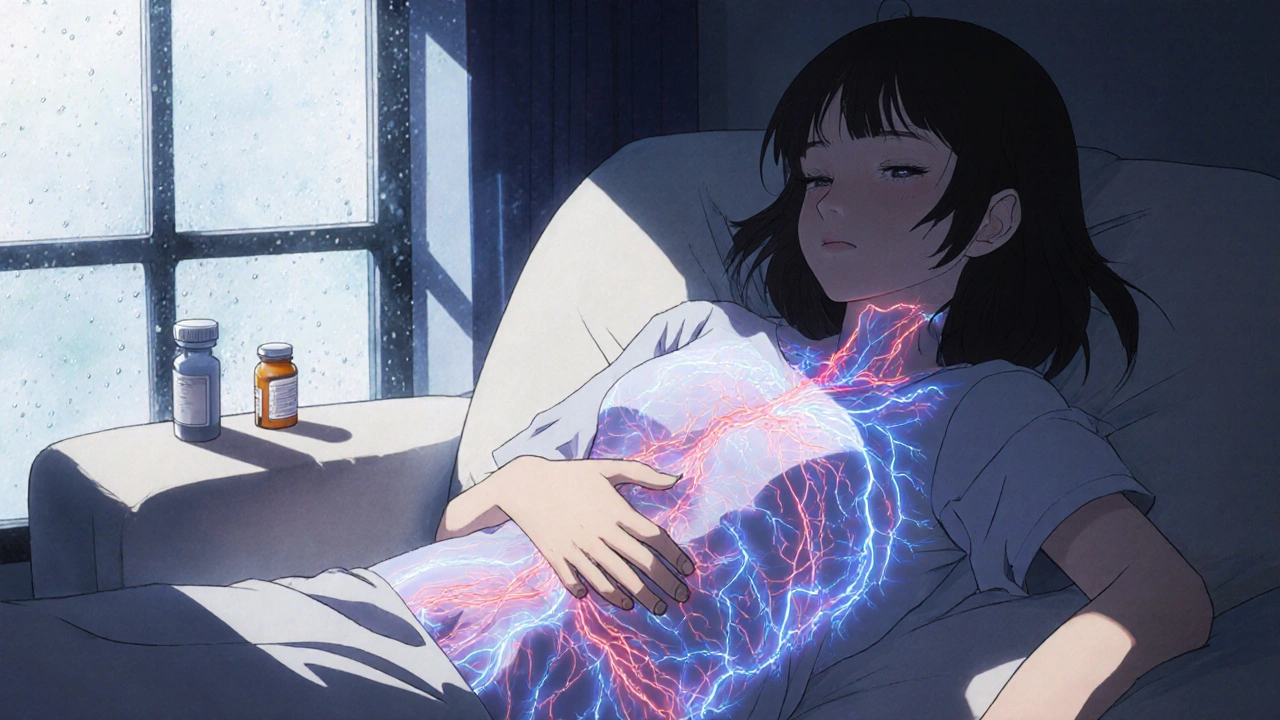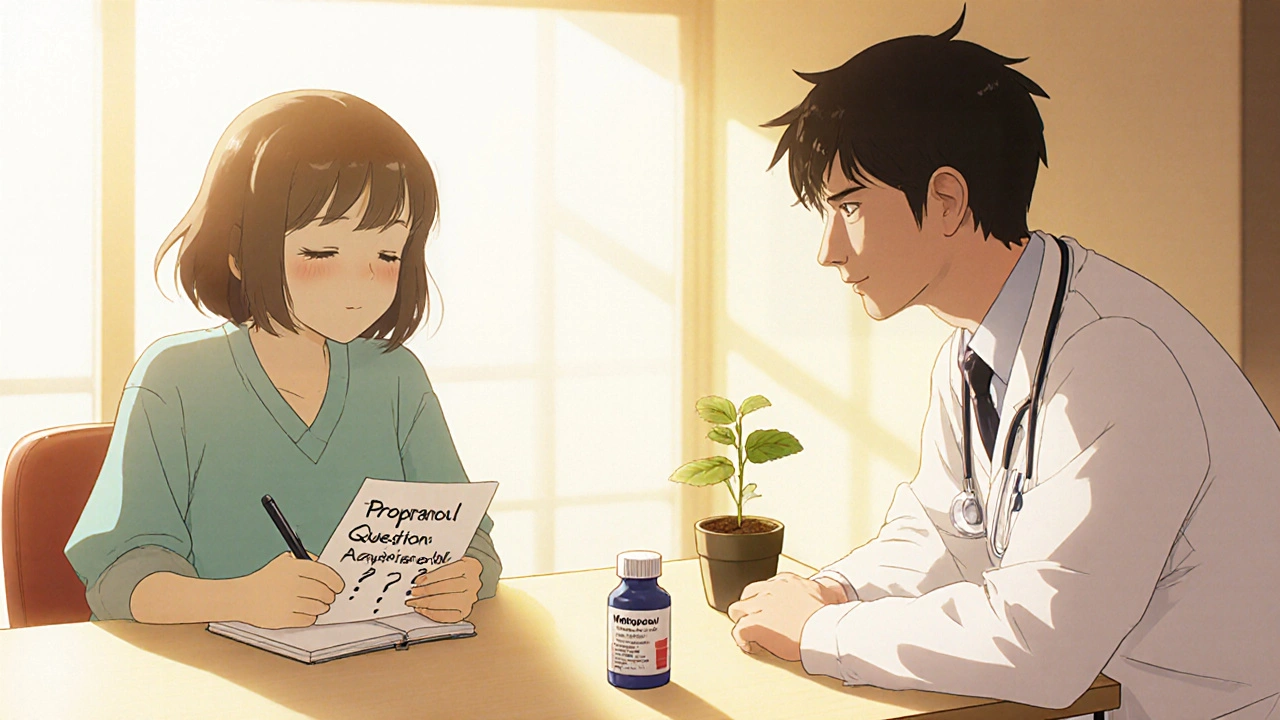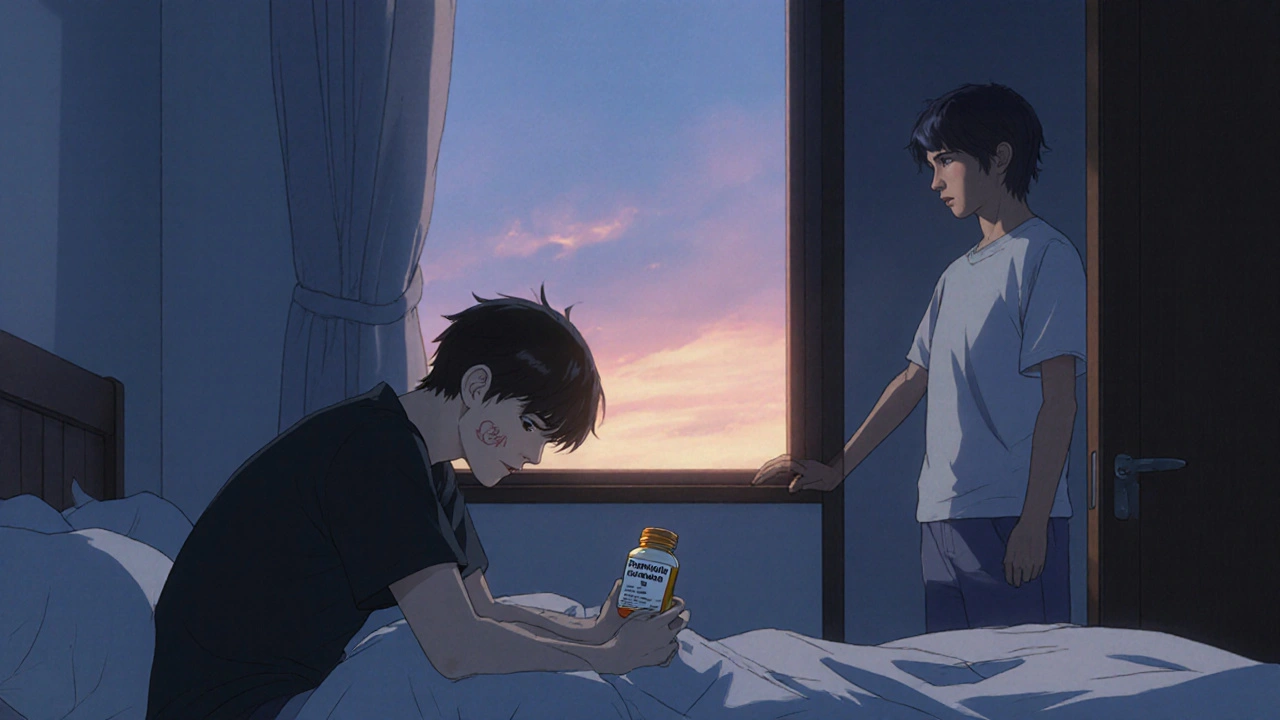Many people take propranolol for high blood pressure, heart conditions, or anxiety-but few know it can quietly change their sex life. If you’ve noticed less interest in sex, trouble getting or keeping an erection, or even reduced pleasure during intimacy, you’re not imagining it. Propranolol doesn’t just slow your heart rate; it can slow down your sexual response too.
What Propranolol Actually Does in Your Body
Propranolol is a beta blocker. That means it blocks adrenaline and other stress hormones from binding to beta receptors in your heart, blood vessels, and nervous system. This lowers your heart rate and blood pressure, which is why doctors prescribe it for heart disease, migraines, and performance anxiety.
But those same beta receptors are also found in the genitals. When propranolol blocks them, it interferes with the physical signals needed for arousal. Blood flow to the penis or clitoris gets restricted. Nerve signals that trigger pleasure and orgasm become less responsive. It’s not a psychological issue-it’s a physical one, caused by how the drug interacts with your body’s natural systems.
How Common Are Sexual Side Effects?
Studies show that between 10% and 30% of people taking propranolol report sexual side effects. In one 2021 review of 12 clinical trials, nearly one in four men experienced erectile dysfunction. Women reported lower libido and reduced ability to reach orgasm. These numbers are higher than many doctors admit.
Here’s the catch: these side effects often go unreported. People feel embarrassed. Others assume it’s just aging, stress, or depression. But if you started taking propranolol and noticed changes in your sex life within a few weeks, the timing isn’t a coincidence.
Why Propranolol Hits Libido Harder Than Other Beta Blockers
Not all beta blockers are the same. Propranolol crosses the blood-brain barrier easily, meaning it affects the central nervous system more than others like metoprolol or atenolol. That’s why it’s used for anxiety-it calms the mind. But that same trait makes it more likely to dampen sexual desire.
Propranolol lowers dopamine and serotonin levels in the brain, two chemicals directly tied to sexual motivation and reward. A 2020 study in the Journal of Sexual Medicine found that men on propranolol had significantly lower scores on sexual desire questionnaires compared to those on other beta blockers. The effect was dose-dependent: the higher the daily dose, the worse the impact.

Real-Life Impact: What It Feels Like
One man in his late 40s, who took 80 mg of propranolol daily for heart palpitations, told his doctor he’d stopped initiating sex. He said, “I still feel attracted to my wife, but my body doesn’t respond. It’s frustrating because I don’t feel like myself.”
A woman in her early 30s, prescribed propranolol for migraines, noticed she no longer felt turned on during foreplay-even with her partner. “I used to look forward to intimacy. Now it feels like a chore. I don’t even get wet anymore.”
These aren’t rare stories. They’re common enough that urologists and gynecologists now routinely ask patients on beta blockers about sexual function during check-ups.
Can You Fix It Without Stopping the Medication?
Yes-but not always easily. Some people try switching to a different beta blocker. Metoprolol and bisoprolol are less likely to cross into the brain and cause sexual side effects. A 2022 study showed that 68% of men who switched from propranolol to metoprolol saw improvement in erections within six weeks.
Lowering the dose can help too. If you’re on 160 mg a day, ask your doctor if 40 mg or 80 mg would still control your condition. Sometimes, half the dose gives the same benefit with fewer side effects.
Some people report improvement with lifestyle changes: regular exercise, reducing alcohol, managing stress, and getting enough sleep. These don’t reverse the drug’s effect, but they can help your body compensate.
What About Supplements or ED Medications?
Drugs like sildenafil (Viagra) or tadalafil (Cialis) can help with erections, but they don’t fix low libido. If your brain isn’t sending the desire signals, a pill won’t bring it back. Some people use them as a band-aid, but they don’t solve the root problem.
There’s no strong evidence that supplements like L-arginine, ginseng, or maca reliably reverse propranolol-related sexual side effects. Some may even interact with your heart medication. Always talk to your doctor before trying anything new.

When to Consider Switching Medications
If sexual side effects are affecting your relationship, self-esteem, or mental health, it’s time to talk to your doctor about alternatives. For anxiety, SSRIs like sertraline or citalopram might be options, though they come with their own sexual side effects. For high blood pressure, ACE inhibitors like lisinopril or calcium channel blockers like amlodipine rarely affect libido.
Don’t stop propranolol on your own. Suddenly stopping can cause rebound high blood pressure, chest pain, or even a heart attack. Work with your doctor to taper safely and find a replacement.
What You Should Ask Your Doctor
- “Is there a different medication that won’t affect my sex life?”
- “Can we try a lower dose first?”
- “Has this happened to other patients on this drug?”
- “Can you refer me to a specialist who understands medication-related sexual side effects?”
Many doctors still treat sexual side effects as an afterthought. But you deserve to live fully-not just survive. If your doctor brushes you off, seek a second opinion. There are specialists in sexual medicine who know exactly how to navigate this.
It’s Not Just in Your Head
Too many people blame themselves when their sex life changes. They think they’re less attractive, less desirable, or not trying hard enough. But if you’re on propranolol and your body isn’t responding the way it used to, the cause is likely the medication-not you.
Sexual health is part of overall health. Ignoring it doesn’t make it go away. Addressing it doesn’t mean you’re being dramatic. It means you’re taking control of your body and your life.
Does propranolol cause permanent sexual dysfunction?
No, sexual side effects from propranolol are usually reversible. Once the drug is stopped or switched, most people see improvement within a few weeks to months. Permanent damage is extremely rare and typically only occurs if the person has other underlying health issues like diabetes or severe vascular disease.
Can women experience sexual side effects from propranolol too?
Yes. Women on propranolol commonly report reduced libido, difficulty becoming aroused, and trouble reaching orgasm. These effects are often overlooked because research has historically focused on men. But studies confirm that women experience similar physical changes due to reduced blood flow and altered hormone signaling.
How long after starting propranolol do sexual side effects appear?
Most people notice changes within 2 to 6 weeks of starting the drug. Some report effects sooner, especially if they’re on a higher dose. If you’ve been on it for months and just noticed a change, it could still be related-side effects can develop gradually as your body adjusts.
Is it safe to take Viagra with propranolol?
Yes, but only under medical supervision. Both drugs lower blood pressure, so combining them can cause dizziness or fainting. Your doctor may need to adjust the dose of either medication. Never take sildenafil or tadalafil without telling your doctor you’re on propranolol.
Should I stop propranolol if it’s affecting my sex life?
Never stop propranolol suddenly. It can cause dangerous spikes in blood pressure or heart rate. Instead, talk to your doctor about switching to a different medication or lowering your dose. Your sexual health matters-but so does your heart health. You need a balanced solution.


Comments
Been on propranolol for migraines for 2 years. Libido dropped off a cliff. Switched to metoprolol last month. Back to normal in 5 weeks. Do not suffer in silence.
Propranolol? Oh, you mean the beta-blocker that’s basically a chemical lobotomy for your libido? Classic. The fact that doctors don’t warn you is criminal. I mean, come on-this isn’t rocket science. Dopamine suppression? Blood flow restriction? Anyone with a 10th grade biology textbook could’ve predicted this. And yet, here we are, medicated into sexual oblivion while the pharma reps sip their lattes.
Let me break this down like I’m explaining it to my cousin who just got diagnosed with hypertension: Propranolol doesn’t just chill your heart-it chills your whole damn nervous system. It’s like putting a blanket over your genitals. The brain-to-penis signal gets muffled. That’s why metoprolol is better-it barely touches the CNS. And yes, switching works. I’ve seen it in my practice. Also, exercise helps. Not because it ‘fixes’ the drug, but because it boosts nitric oxide, which helps blood flow. Don’t just take a pill-move your body. Your libido will thank you.
propranolol bad. sex bad. doctor dont care. just take it. i know cuz my uncle did. now he dont even look at his wife. no joke.
Of course it affects libido-big pharma designed it that way. They know if you’re too horny, you won’t be sitting quietly at your desk taking your pills. Also, did you know the FDA approved this drug in 1967? That’s the same year the moon landing happened. Coincidence? I think not.
Why are you all so obsessed with sex anyway? Back in my village in Nigeria we didn't need Viagra or metoprolol swaps. We had discipline. We had faith. We had work. Now you people think your genitals are more important than your heart. Pathetic.
Let’s be clear-this isn’t about libido. It’s about control. The medical-industrial complex wants you docile, sedated, and obedient. Propranolol dampens your sexual response because a sexually active population is harder to manage. Look at the data: countries with higher beta-blocker prescriptions also have lower birth rates. It’s not correlation-it’s causation. And yes, I’ve run the stats.
Hey, I just want to say-you’re not alone. I’ve had patients cry in my office over this. It’s not weakness. It’s physiology. And you’re right to speak up. If your doctor says ‘it’s all in your head,’ tell them to read the 2020 Journal of Sexual Medicine paper. Seriously. Print it out. Bring it in. And if they still brush you off? Find a new doctor. Your sex life matters as much as your blood pressure. You deserve both.
How quaint. A 12-page essay on why your penis doesn’t work. Next week we’ll have a TED Talk on why your coffee tastes different after taking lisinopril. Honestly, the level of self-absorption in modern healthcare is astounding. Maybe try not thinking about it? Just a thought.
Propranolol is a tool. Like a hammer. If you’re using it to fix your anxiety and now your sex life is broken? Maybe you’re using the wrong tool. But let’s not pretend this is some grand conspiracy. It’s pharmacology. It’s biology. It’s trade-offs. You want lower BP? You get less boner. You want to feel less anxious? You get less desire. Life isn’t a Netflix binge where you get to pick all the perks. Stop whining. Get a new script. Or learn to live with it. Either way, stop treating your genitals like a national emergency.